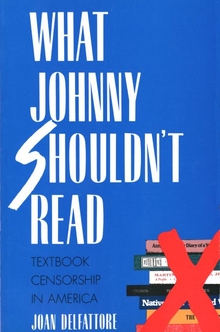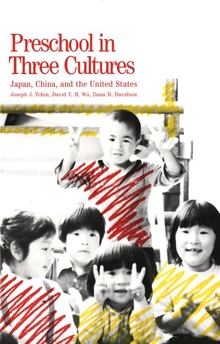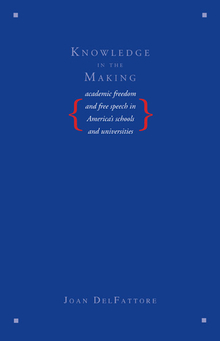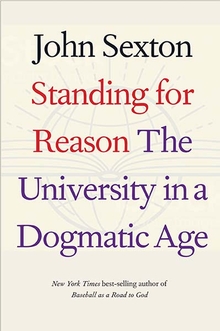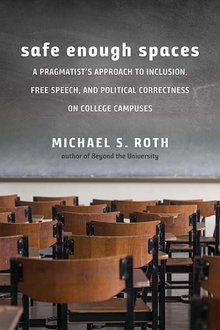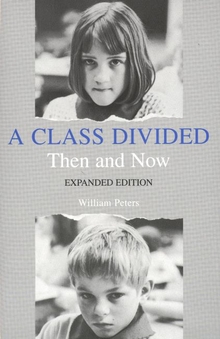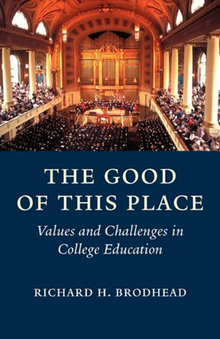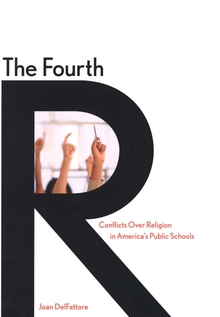What Johnny Shouldn`t Read
WARNING
You are viewing an older version of the Yalebooks website. Please visit out new website with more updated information and a better user experience: https://www.yalebooks.com
Textbook Censorship in America
Joan DelFattore
Efforts to censor elementary and high school textbooks have proliferated in the past decade. Most challenges have come from ultraconservative activists who oppose evolution, racial and ethnic equality, nontraditional gender roles, pacifism, and a host of other issues that contradict their religious, political, or social views. Other protests originate with ultraliberal activists whose goal is to eliminate all negative or traditional descriptions of racial, ethnic, religious, or gender groups, without regard for accuracy or historical context.
DelFattore focuses on recent federal lawsuits involving attempts to censor or ban biology, geology, history, home economics, literature, psychology, reading, and social studies textbooks. She vividly re-creates the story behind each lawsuit, describing how politically sophisticated national organizations turn local controversies into nationally publicized court cases. She also discusses how both ultraliberal and ultraconservative groups in Texas and California pressure their state Boards of Education to demand that sections of textbooks be eliminated or rewritten as a condition of selling the books in those states. Because California and Texas are such important markets, says DelFattore, publishers almost always make the required changes in the books, which are then sold nationwide. As a result, the content of American textbooks is heavily influenced by political and economic forces.
DelFattore's investigation has profound implications not only for education but also for freedom of thought in the larger society. Her book will be mandatory reading for parents, teachers, school administrators, lawyers, librarians, and other concerned citizens.
"DelFattore understands the current censorship climate in relation to school textbooks as well as anybody I know, and her readable, insightful account of how professional censorship groups influence the content of these textbooks is particularly needed today."—James E. Davis, President, National Council of Teachers of English
"A monumental contribution to education in an alarming period of attempts nationwide to remove all kinds of materials from the public schools through intimidation or litigation."—Edward B. Jenkinson, Professor of Education, Indiana University
"The American Association of University Women (AAUW) has a long history of activism in fighting censorship in public schools and libraries. We welcome the publication of What Johnny Shouldn't Read, which documents the threat right-wing censors pose to intellectual freedom. This important book will alert a broad audience to the increasing incidence of censorship in our country."—Anne L. Bryant, Executive Director, American Association of University Women
"An elegant study of the legal and policy issues involved in censorship, written by someone who understands the educational implications and can step back from the contentious fray to analyze as well as to describe the major issues. The book fills an important need in an area of growing public controversy and attention."—Robert M. O'Neil, Director, Thomas Jefferson Center for the Protection of Free Expression
"What Johnny Shouldn't Read is that definitive work on censorship that we have all been waiting for. DelFattore uses the case study method to blend history, law, American literature, sociology and journalism into an academic synergy. A scholarly contribution to the interminable and robust dialogue on the First Amendment."—Chuck Stone, University of North Carolina at Chapel Hill
"[This book will] open the eyes and . . . raise the voices of those who treasure intellectual freedom."—Booklist
"DelFattore's lucid critique should serve as a rallying point for parents, teachers, and administrators who oppose textbook censorship."—Publishers Weekly
"While the focus of this book is on textbook censorship, the discussion is far-reaching. Johnny's classroom anthology is placed in the context of political and social issues."—Library Journal
"A frightening look at the pressures brought to bear on textbook publishers to mollify special interests by modifying schoolbooks. . . . A disturbing report on who's actually influencing what children read in school, suggesting that parents, teachers, and administrators take a closer look at how schoolbooks are chosen—and tampered with."—Kirkus Reviews
"A sobering anatomy of textbook censorship. . . . The book is a good lesson in the logic (or illogic) of censorship."—Choice
"DelFattore offers a clear and thorough overview of the courtroom battles."—Alex Raksin, The Los Angeles Times Book Review
"DelFattore's . . . important and fascinating account ought to stand as a warning."—Alan Wolfe, New Republic
"A fascinating account of censorship. . . . [DelFattore] dissects several of the most-publicized Federal court cases of the 1980s involving attempts to censor schoolbooks, then examines the impact on publishers and on state education officials who authorize purchases of schoolbooks. . . . A highly readable book."—Gene I. Maeroff, New York Times Book Review
"DelFattore traces the path from courtroom to publishing house to show how—win or lose—the controversy that often surrounds lawsuits against . . . authorities can lead publishers to hedge their bets and practice self-censorship."—The Chronicle of Higher Education
"[DelFattore's] summaries of the controversies are diligently researched and lucidly reported."—Times Literary Supplement
"Students studying censorship will find a wealth of material in this thoroughly researched, extensively documented, and readable account of challenges to school reading lists in the 1980's."—School Library Journal
"Must reading for all teachers, school administrators, school board members, and future teachers."—Science Books & Films
"DelFattore's book is timely because of the increasingly effective lobbying, from both political left and political right, to keep the minds of our children free of provocative ideas that are offensive to one group or another. . . . This highly readable, informative, and thought-provoking book employs an illustrative and anecdotal technique designed to engage the attention of the general reader and to focus it on the tension between the rights of free speech and advocacy . . . and our First Amendment devotion to the free exchange of ideas."—Jerimiah S. Gutman, Readings: A Journal of Reviews and Commentary in Mental Health
"What Johnny Shouldn't Read, which is based on court documents, textbook adoption records and interviews, adds to the ongoing discussion of textbook censorship in 20th-century America by describing how these lawsuits combined with the textbook adoption process nationwide. . . . DelFattore's book is a must read for anyone who plans to vote, think and improve, not necessarily in that order."—Stephen Schwandt, Minneapolis Star Tribune
"Relying on court documents, textbook adoption records, and news accounts, DelFattore . . . shows how and why the censors have worked their will in the educational system. . . . DelFattore has written an impressively researched book on a vital matter."—Elizabeth Shostak, Wilson Library Bulletin
"DelFattore's monumental, well-researched, highly readable book clearly spells out the attacks on school books in the mid-eighties that have continued into the nineties and are likely to gain momentum. What Johnny Shouldn't Read should be read by every teacher, administrator, and parent who wants the children of this country to grow up being free to read, free to think for themselves, and free to make decisions. It is a chilling book. It carefully describes the textbook controversy, which will not end; thus, educators must understand the issues and problems involved. And DelFattore's book serves as an excellent introduction."—Edward Jenkinson, Educational Researcher
"A compelling and important book about the struggles between parents and school officials, who are 'locked in competition for the minds and souls of children'...What Johnny Shouldn't Read is good reading for teachers, students, parents, and citizens alike. Relatively short and well-written, this book could be used as a case study in a variety of courses focusing upon law and society, education, politics, and public policy."—Focus on Law Studies
"A valuable contribution."—Paul Rich, Journal of Educational Administration and History
"Rich with important issues and ideas....Teachers at all levels, administrators and librarians will find much to think about in this book. However, people like 'us' are encouraged to read it with a critical eye and an extra ration of sympathy for other points of view."—April D. Nauman and Victoria Chou Hare, Journal of Curriculum Studies
"Much has been written on the subject of textbook censorship but DelFattore's book is the most reasonable, accessible and personal that I have read. She makes us understand the passions of the people involved in both sides of this difficult continuing controversy."—Harry Themal, Wilmington News Journal
"A thorough, elegant survey."—The Observer
"What Johnny Shouldn't Read is not only shocking, but it also makes one think about the freedom of thought or expression. A recommended book for all ages, races, genders, and religions."—Wendy Summers, Contemporary Education
"[A] systematic analysis of federal textbook lawsuits and statewide textbook adoptions to assess the effect of protestors on producing and selecting educational materials. . . . Recommended for all readers interested in an investigation of textbook activism."—Sandra L. Wong, Contemporary Sociology
"This book should not only be part of every library's collection, it should be required reading for school boards, library boards and trustees."—Patrice McDermott, Newsletter on Intellectual Freedom
"This book of broad general interest, . . provides a succinct and readable overview for anyone interested in the often very public ideological struggles over what texts are available to elementary and secondary students in U.S. public schools."—Mary K. Biagini, The Library Quarterly
"This is a most engaging work and a politically committed one, too, staunchly siding with school boards, teachers, and civil liberties advocates in their defense against the fundamentalist assault. Suddenly, the poor textbook is hero, not goat."—Michael Schudson, Journal of Communication
"DelFattore . . . demonstrates exactly how incendiary conflicts over prayers and Bible reading in public schools have been. . . . A thorough study that is a pleasure to read."—Peter Steinfels, New York Times (Education section)
"DelFattore exposes the serious—indeed, frightening—pressures, as well as the people and groups behind them, challenging public education today. We ignore her words not only at the risk of our children's future, but also at the risk of this nation's future."—Judith F. Krug, Director, Office for Intellectual Freedom, American Library Association
Publication Date: August 31, 1994

